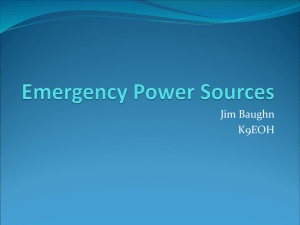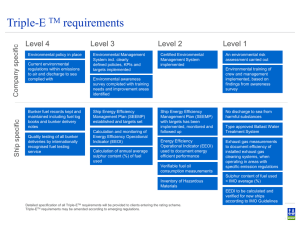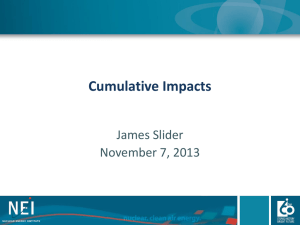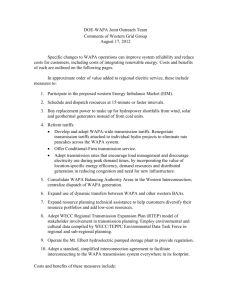WATER & POWER AUTHORITY Spill Response Capabilities and
advertisement
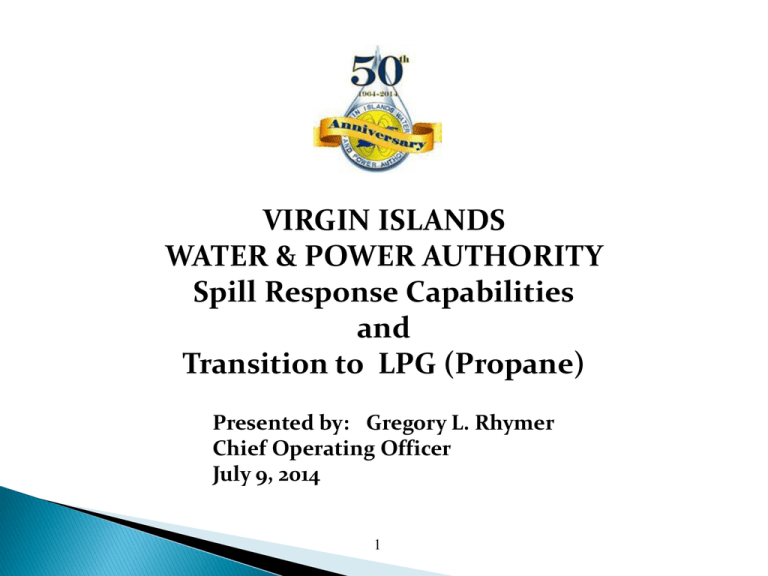
VIRGIN ISLANDS WATER & POWER AUTHORITY Spill Response Capabilities and Transition to LPG (Propane) Presented by: Gregory L. Rhymer Chief Operating Officer July 9, 2014 1 WAPA is a Government Owned Utility Primary Source of Water & Power Production & Distribution in the Territory Power Generation Capability –(100 % fuel oil) St. Thomas/ St. John - 198 MW St. Croix - 118 MW Water Production Capability (R.O.) St. Thomas/St. John – 3.3 MGD (current ) w/1.1 MGD option St. Croix - 3.7 MGD (current ) w/1.1 MGD option Customers Water - 12,390 Electric – 54,113 Territorial Peak Power St. Thomas/St. John - 45 MW min.– 75 MW max. (seasonal avg.) St. Croix - 30 MW min.- 55 MW max. (seasonal avg.) Fiscal Year 2013 Operating Expense: $354,000,007 $242,948,463 - Fuel Oil Cost 68.6% Fiscal Year 2013 Operating Expense 2 Spill Response Capabilities 3 Randolph Harley-Krum Bay Facility Randolph Harley-Krum Bay Facility St.St.Thomas, USVI Thomas, USVI Randolph Harley-Krum Bay Facility is located on the western side of Krum Bay, approximately 2 miles southwest of Charlotte Amalie. Power is generated by the combustion of No. 6 and No. 2 fuel, delivered by barge to the Fuel Pier and pumped to storage tanks. Bulk Storage Tanks: Tanks 10, 11, 12, and 13 have individual steel secondary containment walls. Tanks 14 and 15 share a common steel secondary containment wall. Worst Case Discharge from largest tanks 2,268,000 gallons No. 6 Oil. WCD - Tank Rupture of Tank 12 or 13 with a simultaneous failure of the secondary containment. 4 Estate Richmond Facility St. Croix, USVI Richmond Facility is located on the northern side of Christiansted, St. Croix. Power is generated by the combustion of No. 6 and No. 2 fuel, delivered by barge to the Fuel Pier and pumped to storage tanks. Bulk Storage Tanks: Tanks 5, 6, and 7 have individual steel secondary containment walls Tanks 3 and 4 share a common secondary containment Worst Case Discharge from largest tank 5 which holds a maximum of 2,230,353 gallons No. 2 Oil WCD - Tank Rupture of Tank 5 with a simultaneous failure of the secondary containment 5 VIWAPA Facility Response ActionAction Plan VIWAPA Facility Response Plan WAPA has ability to take immediate actions to respond to any discharge Stop Flow Enforce Safety and Security Measures Shut-off Ignition Sources Commence Internal and External Notifications per FRP Commence Spill Response Actions Tier 1 Response WAPA Immediately Activate On-Site Response Resources Small Discharges or Average Most Probable Discharge (AMPD) will be handled by WAPA resources Tier II and Tier III Response National Response Corporation (NRC) 6 Randolph Harley-Krum Bay Facility Krum Bay Facility, St. Thomas On-Site Response Resources On-Site Response Resources Tier 1 Response Capabilities – Within 12 Hours WAPA On-Site Response Equipment Oil Recovery – Weir Disk Skimmer 548 BBLS of Effective Daily Recovery Stored in Warehouse at Fuel Pier 8,000 Ft., 8-inch Boom Purpose would be to set a containment barrier Stored in a trailer at Fuel Pier 4,000 Ft., 8-inch Absorbent Sausage Boom Stored in Warehouse at Fuel Pier 7 Richmond Facility On-Site Response Resources Tier 1 Response Capabilities – Within 12 Hours WAPA On-Site Response Equipment Oil Recovery – Two Weir Disk Skimmers o 4800 total BBLS of Effective Daily Recovery o Stored in the Fuel Department Building Vacuum Truck o 788 gals per load 2,900 Ft., 8-inch boom Purpose would be to set a containment barrier around the pier and effluent discharge point. Stored on a motorized reel and, additional lengths, in trailers at by the Fuel Department Building 3,488 Ft., 8-inch Absorbent Sausage Boom Stored in trailers at by the Fuel Department 8 Response Equipment within 12 hours Response Equipment Within 12 Hours St.St.Thomas St. Croix WAPA Facilities Thomas / /St. Croix Tier II Response Capabilities – Within 12 Hours National Response Corporation (NRC) Equipment 12 – Hours Boom 52,700 FT Effective Daily Recovery (EDRC) 77,640 / day BBLS Portable Storage 60,000 BBLS Vessels Personnel 30 Oil Spill Response Vessel, St. Croix, USVI Marko Skimmer St. Croix, USVI Portable Barge Sets St. Croix, USVI 150 Vacuum Transfer Unit St. Croix, USVI 9 Response Equipment Within 24 – 36 Hours of USVI Tier II – III Response Capability Equipment 24Hours 36 Hours Boom 61,700 FT 107,800 FT EDRC 158,024 BBLS 296,322 BBLS Portable Storage 216,019 BBLS 230,528 BBLS Vessels 34 90 463 597 Personnel 10 WAPA – Annual Exercise & Compliance NRC Support Services to VIWAPA Programs Annual Spill Management Team Table Top Exercises Annual Incident Management System (ICS) Training Annual HAZWOPER Training First Responder Awareness First Responder Operation Level Accommodating Crews on St. Thomas & St. Croix Semi-Annual Equipment Deployment Training Annual Boom Deployment Training Accommodating Crews on St. Thomas & St. Croix Additional WAPA Programs • RCRA – Resource Conservation & Recovery Act • SPCC – Spill Prevention Countermeasure Control 11 NRC OSRO Services for USVI NRC Caribbean Response Manager positioned in San Juan, PR NRC Response Manager in St. Croix, USVI NRC Response Crew in St. Croix, USVI (5 Personnel) Independent Contract Network (ICN) in St. Thomas, St. Croix, San Juan, PR; and US Mainland Access to Additional ICN Equipment through NRC Access to NRC and NRC Contracted Personnel PREP Credit for VIWAPA and NRC Spill Management Team Table-Top & Equipment Deployment Exercises Routine Industry and Regulatory Updates from NRC via NRC’S Client Advisory Letters (CAL) 12 Transition to LPG 13 Fuel cost is $0.40 per kwh; customer cost is $0.51 for residential and $0.54 for commercial customers per kwh This is highest cost for electricity than any other U.S. state, territory or possession Two independent power generating facilities that are not able to be interconnected primarily due to very deep water depths between islands Main industry in the U.S. Virgin Islands is tourism Closure of the HOVENSA refinery resulted in loss of cheap fuel oil at incentive pricing and significant adverse impact on Territory’s residents and economy 14 July 2013, WAPA signed a turnkey master agreement with Vitol Virgin Islands Corp. (Vitol) for infrastructure construction, conversion of existing combustion turbines, supply, and delivery of propane at WAPA’s power plants on St. Thomas and St. Croix. ◦ Vitol is the world’s largest independent physical trader in the oil and oil products market and a provider of procurement, storage, processing and transportation services of oil related commodities. ◦ All upfront costs are paid by Vitol. WAPA repays Vitol over 7 year amortization (option to repay in 5 years) • Target completion: 4th quarter of 2014 • All-in cost will result in approximately 30% reduction in fuel costs 15 $ per Million BTU Actual Cost of Fuel oil vs. Projected Cost of Propane $25 $20 $15 ~ 30% Fuel Cost Reduction $10 $5 $Fuel Oil Propane Estimate based on WAPA’s actual price for fuel in February 2014; The propane cost considered above includes a 5 year amortization of the facilities capital expenditures (construction of new propane storage terminals, repair/upgrade of fuel transfer docks and conversion of WAPA’s turbines in the St. Thomas & St. Croix Districts). After 5 years, propane costs will further be reduced. 16 Propane will be delivered by tanker vessels to a floating storage tanker vessel. Floating storage vessel will be anchored several miles offshore. Propane will then be transferred from the floating storage vessel to feeder ships that will deliver fuel to the power plants . Feeder ships will be double hulled & compliant with international safety standards. New supplies will arrive at the plants approximately every three days. Average 15-day reserve inventory at each plant. Propane will be transferred through a pipeline on WAPA property into storage tanks that will be onsite. 17 Storage tanks will be “mounded” - encased by layers of earth, sand, rock and gravel to maximize safety. ( 165 ft. L x 18 ft. dia. x 30 ft. H.) (Wt. 315 tons) The benefits of mounded tanks include: • Significant protective barrier from external damage and fire • Elimination of oxygen, preventing uncontrolled ignition • Additional barrier for earthquake and hurricane protection Rendition of St. Croix onshore terminal Tank Size St. Croix (8 tanks) St. Thomas (10 tanks) Total Storage Capacity 10,400 m3 65, 500 bbls. 14,000 m3 88,000 bbls. Effective Supply 19.2 days 18.3 days Facilities carefully designed to ensure employees’ and the public’s health, safety, and protection Completed Comprehensive Fire Risk Assessment and Hazardous Area Classification Emergency Response Plans for each facility and all existing applicable environmental permits and plans are being updated Fire safety features planned for WAPA’s propane project will have 100% redundancy Firefighting systems for the facilities will be National Fire Protection Association (NFPA) compliant, including a “water blanket” that will suppress a leak or flame. Facilities will be equipped with gas monitoring and leak detection systems VI Port Authority marine pilots have simulated navigation of feeder vessels to ensure safety of marine operations 19 20 percent reduction in greenhouse gas emissions compared to fuel oil Over 80 percent reduction in particulate matter (soot), Sulfur Dioxide, and Carbon Monoxide emissions Propane helps to integrate renewable sources of energy into the grid No foreseen obstacles in securing final air, land, or water permits 20 Engineering; ◦ Engineering substantially completed, integration of vendor information ongoing. ◦ Process design, civil design, structural design, piping & mechanical design are completed. ◦ Electrical, Instrumentation and Automation design under final review. Procurement; ◦ Procurement of long lead items substantially completed. ◦ Delivery of first long lead items scheduled for July (LPG Bullets, Emergency Generators). ◦ IFB of Piping & Mechanical Works issued 04 July 2014 ◦ Bids for marine works received, negotiations with shortlisted bidder ongoing. 21 Construction: ◦ STX and STT Demolition earthworks and demolition scope completed. STT 59,000 cubic yard of rock removed ◦ STX piling (900) works 50% completed. ◦ STT retaining works 25% completed. ◦ STT & STX Civil contractor; mobilization in progress works to commence on site 7 July 2014. ◦ GE To mobilize and commence conversion works on the turbines in mid- July. Overall project progress is 58% based on the revised project budget. With the award of the civil contract the project progress will be 75% , once that actual work is completed. 22 Communicating the benefits of switching to propane remains crucial to project success. WAPA brought on FTI Consulting to help inform the public and mitigate project risk. Project website and social media: Poweringvi.vi, Powering VI Facebook page, YouTube Chanel. Ongoing meetings with community leaders and stakeholders. Local press briefings and media interviews. Ongoing Bi-lingual radio and internet public announcements. 23 This project represents the best near-term option to significantly reduce the cost of fuel for power generation while ensuring widespread benefits for the Territory. 25


